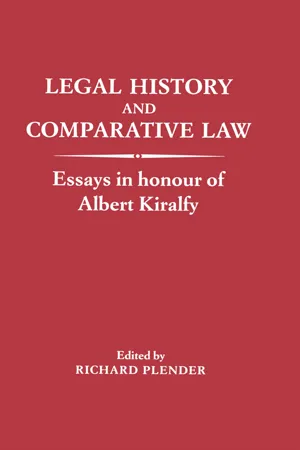Law
Public Interest
Public interest refers to the common good or welfare of the general public. In the legal context, it often refers to actions or decisions that benefit the broader community rather than specific individuals or groups. The concept of public interest is used to guide laws, policies, and regulations to ensure they serve the greater good of society.
Written by Perlego with AI-assistance
6 Key excerpts on "Public Interest"
Learn about this page
Index pages curate the most relevant extracts from our library of academic textbooks. They’ve been created using an in-house natural language model (NLM), each adding context and meaning to key research topics.
- eBook - ePub
- John A. Consiglio(Author)
- 2020(Publication Date)
- Emerald Publishing Limited(Publisher)
In several contexts (some even populistic), “the Public Interest” and “social goals” are often viewed as one and the same thing, but, despite this reality, regulation can still come to be seen as the instrument of some specific or narrow social grouping, or alternatively as only being directed to either a general or a specific social purpose. The time factor seems to craftily play itself into the reasoning here. Is the advancement of the public good only that which is shaped by either specifically the needs of the here-and-now, or those of the long-term social goals? As Gauci rightly points out, there is never much specific, or scientifically documented, presumption that regulation would actually have this or that specific effect either at the start of a regulation or, indeed, over time (Gauci, 1993).So one needs to engage in a more broad and much wider analysis of the whole big concept of the relationship between Public Interest and regulation.The general, indeed perhaps simplistic, definition of Public Interest is that it is the general welfare of the public, plain and simple, now and forever hereinafter. But compare that approach to the one where the Public Interest is described as benefitting the larger part of the public (and should the minor part be dammed?!) and at specific times and places. Experience has shown that in different parts of the public domain, different necessities have forced different approaches. Maltese media legislation, for example, offers a perhaps better crafted definition than the above. It holds that “Public Interest is not to be confessed within narrow limits. Whenever a matter is such as to effect people at large, so that they may be legitimately interested in or concerned at what is going on, or what may happen to them or others, then it is a matter of Public Interest, on which everyone is entitled to make fair comment.”7Notice, “people at large”…if it only interests you, then it (most possibly) is not really of Public Interest at large.In other sectors, attempts at defining what Public Interest is, who should be doing what, and when, and in what matters, present us with a very wide picture of considerations. To take another example: regulation of the gaming sector. It is often argued that regulation in this sector “should be [one may even read the simple term “exist”] carried out [only?] in the Public Interest”. Is the engaging in games of chance, with the often related elements of “odds” (to what extent actuarially calculated?) is that of “Public Interest”; notice “interest,” not “benefit!” And the economic benefit reasons or effects (e.g., creation of jobs, tax incomes, etc.) are thenceforth often trooped out. When specific targets or objectives are being statutorily stated, and following principles of proportionality, nondiscrimination, and consideration of risk being also stated, we then often find that the overall Public Interest could be said to be summed up in certain legal clauses that clearly state that “in case of conflict between Public Interest and economic considerations, [then] Public Interest considerations shall [would] prevail - eBook - ePub
The New Public Service
Serving, Not Steering
- Janet V. Denhardt, Robert B. Denhardt(Authors)
- 2015(Publication Date)
- Routledge(Publisher)
This chapter will explore the concept of the Public Interest. We will begin with a look at the various ways the Public Interest has been defined, noting competing ideas about what purpose, if any, the concept serves in governance. We will then review how the notion of Public Interest was understood at the time the field of public administration was founded in the United States and trace some of the reasons for its decline as a central component of public administration theory and practice. We will then ask how conceptions of the Public Interest have changed over time, and what are the controversies and issues regarding its existence and meaning. We will also ask about the importance of the Public Interest from an administrative perspective. We will then discuss how the Public Interest has been conceived in the Old Public Administration and the New Public Management, concluding with some thoughts about how the search for the Public Interest shapes the New Public Service.What is the Public Interest?In the last 100 years, the concept of the Public Interest has been variously derided, applauded, dismissed, and revived—leaving little consensus on what it means or if it is even a useful concept. Walter Lippman defined the Public Interest as “what men would choose if they saw clearly, thought rationally, and acted disinterestedly, and benevolently” (1955, 42). Glendon Schubert, however, suggested that the concept of the Public Interest “makes no operational sense…. Political scientists might better spend their time nurturing concepts that offer greater promise of becoming useful tools in the scientific study of political responsibility” (1962, 176). Likewise, Frank Sorauf stated that the term is “too burdened with multiple meanings for valuable use” (1957, 624). Howard Smith, on the other hand, said that, although the Public Interest is a myth, it is a useful myth (1960). Still others have pointed out that, regardless of its ambiguity, “there has never been a society which was not, in some way, and to some extent guided by this ideal” (Bell and Kristol 1965, 5). Despite this disagreement, the concept of the Public Interest has remained important in public discourse and academic literature. - eBook - ePub
- Eric R. Boot(Author)
- 2019(Publication Date)
- Routledge(Publisher)
If a law or policy serves the common good – a term closely related to the Public Interest 41 – this does not mean that the law or policy is aimed at realizing a particular conception of the good (or even various conceptions of the good) that individuals may have. It seems to me that the only interests we can reasonably be said to all share in our role as members of the public are interests in conditions that render it possible for each of us to develop and strive to realize our own values, objectives, and life plans. Or, to put it another way, if something is in the Public Interest, then it is instrumental for the realization of individuals’ private interests, provided the pursuit of these interests does not reduce the ability of other members of the community to pursue theirs. This civic account of the Public Interest obviously does not deny that the private interests of individual members of the community may differ from one another and may even conflict; all it states is that the interests we share as members of the community are interests in conditions that need to be in place if all members are to be able to pursue their own interests. 42 For example, the unchecked arbitrary exercise of power by a ruler makes it very problematic to draft a life plan, let alone realize it, given that we do not know for sure that what is permissible today won’t be decreed impermissible tomorrow. Hence, a shared interest in the rule of law. Similarly, without a sphere of protected free agency, both the formulation and the realization of a life plan become extremely difficult. We thus share an interest in fundamental human rights. 43 Further examples of interests we share in our capacity as members of the public include interests in legal certainty, the separation of powers, and political accountability. Of course, this civic account of the Public Interest, which expands upon Barry’s approach to the Public Interest, does not do away with all problems - eBook - ePub
Legal History and Comparative Law
Essays in Honour of Albert Kilralfy
- Richard Plender(Author)
- 2018(Publication Date)
- Routledge(Publisher)
An analysis of the meaning of “Public Interest” in two analogous areas of law will lead to quite different answers. III Fair Comment on Matters of Public Interest Perhaps the best-established definition of “Public Interest” in English law lies in the defence of “fair comment on a matter of Public Interest” in the law of defamation. According to Lord Denning’s classic definition the scope of “Public Interest” is broad: Whenever a matter is such as to affect people at large, so that they may be legitimately interested in or concerned at what is going on or what may happen to them or to others; then it is a matter of Public Interest on which everyone is entitled to make fair comment. 9 The learned editors of Gatley on Defamation set out recognised heads of “Public Interest” including, amongst others, “the public conduct of any man who holds, or seeks, a public office or position of the public trust”, “political and state matters”, “church matters”, “books, pictures and works of art generally”, “public performers, actors, singers etc.”, and the catchall “anything which may fairly be said to invite comment or challenge public attention”. 10 At first sight this broad definition (and the cases that fall under it) would appear fruitful for those seeking to establish the meaning of “public concern” and “for the public benefit”. The publication of defamatory statements after all can be regarded as a wrong analogous to the publication of material constituting an infringement of the right of privacy in so far as the harm complained of in both types of action is mental distress - eBook - ePub
- John Raymond LaBrosse, Rodrigo Olivares-Caminal, Dalvinder Singh(Authors)
- 2020(Publication Date)
- Informa Law from Routledge(Publisher)
It is also clear that over the past 20 years there has been a blurring of the distinction between the regulation of private and public sectors. This is mainly driven by the market as a regulator. The impact of privatisation and the insertion of competitiveness into public goods and services are seen as a primary function of regulation. Essentially the evolution of public sector finance and spending has embraced many market characteristics. The movement from volume-term to cash-based spending in the 1980s was complemented by the introduction of resource accounting in the public sector. This is said to achieve an accurate picture of government spending encapsulated by the model of company accounts. The audit industry when applied to the public sector has gone beyond the “true and fair” view of trading and has embraced value-for-money studies. European public procurement rules have sought to achieve integration in the internal market on the assumption that adopting a common purchasing regime will secure efficiency gains, savings in public finance and industry-wide performance measurements that will create restructuring of markets and competitive effects. Nevertheless, the guardian of the Public Interest continually differentiates the public sector; sets priorities in reliability and predictability in tendering and enhances institutional building. This creates public confidence and through accountability greater public awareness of costs. The public as stakeholders may act to help deliver policy differentials.The value of public law73 regulation is to create an interface between public and private sectors and through various economic instruments reflect policy choices that may have long-term effects. Economic downturns are also an opportunity to reconsider the existing order. Some commentators may see this as an apt moment to address existing economic inequality and to build on the democratic principles of more inclusive government, including a re-invigorated social contract. Others may see the opportunity to define the Public Interest more widely than social inclusion while also addressing the need for sustainable development and environmental protection. This may extend to obligations for energy efficiency to sustainable policies on recycling, foreign aid programmes and multilateral development. The ability to channel public funds into various private sectors engages with socially responsible investment practices. The public funding of major banks and institutions is an ideal opportunity to consider how regulating financial markets engages with socially responsible investment strategies that seek to enhance and protect the Public Interest for future generations.73. Page, “Public Law and Economic Policy; The United Kingdom Experience” (1982) 9 Journal of Law and Society, p. 225.Regulating the financial institutions provides an opportunity for strategic thinking and through public financial control transparency and openness in the way market choices are made. This sets important dilemmas for the role of law where there is considerably potential for greater juridification of this sector and raises issues about duties and responsibilities and to what extent they are owed and to whom. The value of judicial discourse is that it underlines the significance of Parliamentary accountability and the strengthening of public oversight. In terms of Bagheot’s concern about the “delicacy” of the financial markets and “its danger” is that adopting post-legislative scrutiny over banking legislation and creating a designated specialist standing select committee that allows a holistic approach to regulation, which was absent in the past. It might also encourage a discussion of the Public Interest and its application in delivering financial policies through the investment of public money. - eBook - ePub
- Chris Frost(Author)
- 2019(Publication Date)
- Routledge(Publisher)
www.ipso.co.uk/editors-code-of-practice/#ThePublicInterest accessed Mar. 2019). Editors would need to justify such a broad defence by demonstrating “that they reasonably believed publication – or journalistic activity taken with a view to publication – would both serve, and be proportionate to, the public, the Public Interest and explain how they reached that decision at that time” (ibid.). However, Leveson goes on to recognise that these Public Interest powers must be used consistently with other democratic powers including the law and the personal and public rights of others.The IPSO code of practice as amended in 2016 also identifies the Public Interest as including:- Detecting or exposing crime, or the threat of crime, or serious impropriety.
- Protecting public health or safety.
- Protecting the public from being misled by an action or statement of an individual or organisation.
- Disclosing a person or organisation’s failure or likely failure to comply with any obligation to which they are subject.
- Disclosing a miscarriage of justice.
- Raising or contributing to a matter of public debate, including serious cases of impropriety, unethical conduct or incompetence concerning the public.
- Disclosing concealment, or likely concealment, of any of the above. (Ibid.)
Ofcom, in its broadcasting code, outlines a range of circumstances in which privacy can only be invaded if warranted. This has a particular meaning in that broadcasters should be able to demonstrate why intrusion in that instance is warranted. One of the reasons could be that the coverage is in the Public Interest and that the Public Interest outweighs the right to privacy. Ofcom gives examples of Public Interest as: “revealing or detecting crime, protecting public health or safety, exposing misleading claims made by individuals or organisations or disclosing incompetence that affects the public” (www.ofcom.org.uk/tv-radio-and-on-demand/broadcast-codes/broadcast-code/section-eight-privacy





